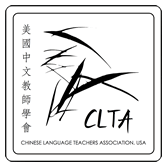From the President
September 2002
Source: CLTA Newsletter 26.2. September 2002, p. 3. September 2002
The Chinese language teaching field is facing a challenging and exciting time. For many reasons, we can anticipate a significant growth in enrollments over the next decade. Enrollment in heritage schools has already skyrocketed. The economic vitality of the Chinese speaking world is attracting increasing numbers of students to Chinese language programs at the college and high school levels. U.S. government support for Chinese language study through the National Security Education Program (NSEP) for graduate and undergraduate students will contribute to this growth. The U.S. government has designated Mandarin Chinese as a critical language for diplomacy and defense, and recent publications from the U.S. General Accounting Office report that most government agencies with foreign language needs have a shortage of personnel with Chinese language skills. This well-publicized need will also contribute to the growth of enrollments in Chinese language.That is the excitement. Here are some of the challenges. 1) Demand for Chinese language programs is not easily satisfied. Language positions at the high school and college level are difficult to create, even in the face of student interest and national need. In most cases, language programs operate on a ‘zero sum’ principle: a position is added in one language at the expense of another, and it is often difficult if not impossible to eliminate existing positions. 2) Heritage learners often enter high school and college with different skills from students whose language is acquired entirely in the class-room. The advanced skills of many heritage learners provide them with an excellent chance of reaching high levels of language proficiency, but most high school and college programs lack the staffing and flexibility to accommodate their needs. 3) Chinese language skills are typically not a marketable commodity in and of themselves. Students who wish to use their language skills in their future career typically must combine language study with study in a non-language discipline. But many programs at the college level do not encourage or require language study within the non-language major. Thus, a history major focusing on Chinese history often need not study Chinese. At the graduate level, language study often may not fulfill degree requirements. Students often choose to forgo time-consuming language study, discovering too late that they lack the skills to continue in their field.
How do we meet these challenges? We can begin by working with our administrators and colleagues at our institutions. We must convince our administrators of the importance of Chinese language study in to-day’s world, and work with them to expand overall language offerings to accommodate Chinese language programs. We must convince our administrators of the need to provide the resources for heritage students, and we need to encourage these students to see the relevance of advanced language study in their future careers. We must work with our colleagues in other disciplines to create a model for the integration of language study into all relevant disciplines so that students are fully prepared to participate in the China field of their choice. These are difficult tasks, especially if we try to accomplish them alone. So don’t do it alone. Go to meetings attended by colleagues in other disciplines such as the national and regional meetings of AAS and help to shape the vision of Chinese studies. And of course, come to the CLTA annual meeting and share your experiences with your colleagues at other institutions. See you in November in Salt Lake City.
Claudia Ross, Beijing
